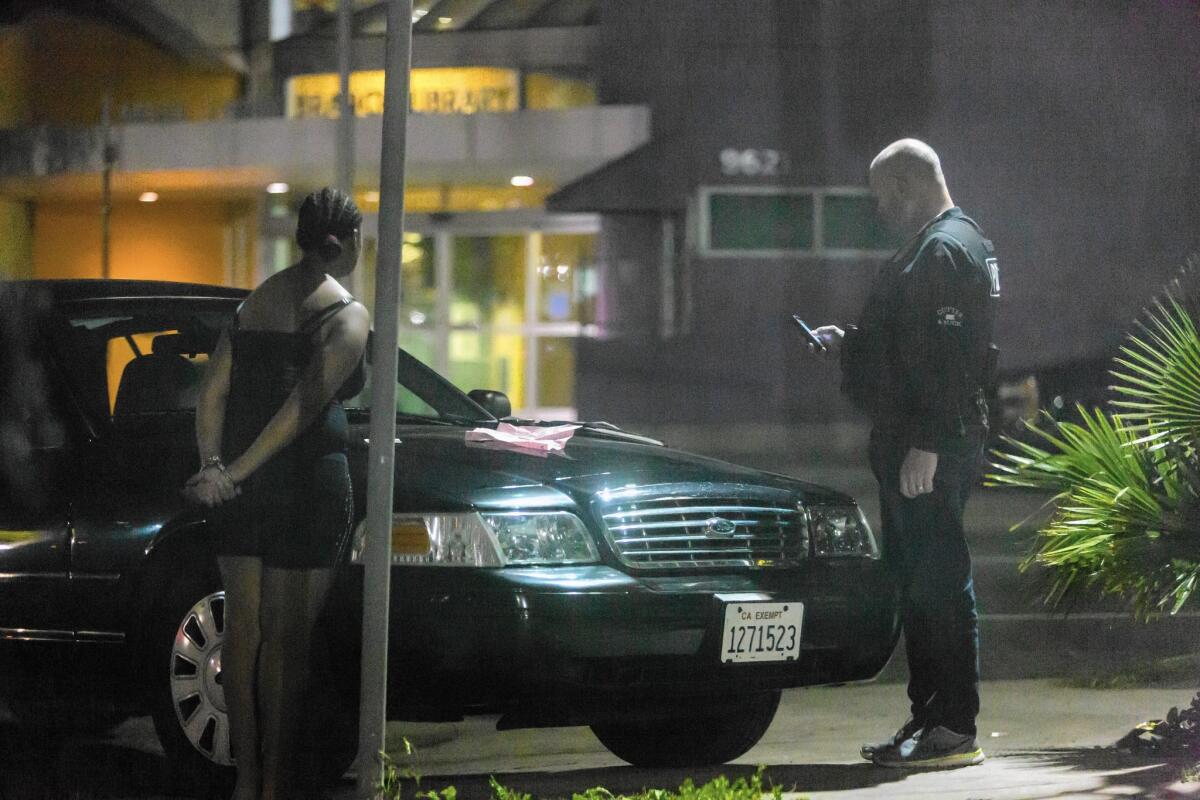State lawmakers’ competing ideas on how to stop human trafficking prevent steps forward, critics say

- Share via
Reporting from Sacramento — Before she became district attorney in Alameda County, Nancy O’Malley prosecuted rape cases. She soon came to recognize a number of young women and girls who cycled through the courtroom.
Their stories were always the same, she says. They loved their boyfriends, who coerced them into selling sex to other men.
“That is when we started seeing that there was money attached to sexual exploitation,” she said. A lot of money.
Two decades later, the trade of forced sex and labor now has a name and its own criminal statute — human trafficking. And in recent years, as advocates and prosecutors like O’Malley have worked to push the issue to the political forefront, there has been no shortage of proposed solutions in the state Capitol.
More than 30 bills this legislative session alone have attempted to combat a multibillion-dollar industry that now operates as much online, if not more, as it does on the streets. But much of the legislation, still pending as lawmakers return to Sacramento for their final month of deliberations, varies in its approach to the problem. Critics say the competing proposals present a difficult path forward.
There is no easy solution to modern-day slavery — if there was, we would have already been doing it.
— Stephanie Richard, policy and legal services director at the Coalition to Abolish Slavery and Trafficking
“There is no easy solution to modern-day slavery — if there was, we would have already been doing it,” said Stephanie Richard, policy and legal services director at the Coalition to Abolish Slavery and Trafficking.
California passed its first laws against human trafficking in 2005, five years after a federal law to crack down on the international trade of victims brought attention to the vulnerable children and teens swept into the industry.
“Federal lawmakers used to think it happened only in third world countries, and we noticed that it was a large criminal industry right here in our own counties,” said Chief Deputy Dist. Atty. Summer Stephan, who heads the Human Trafficking Advisory Council in San Diego County.
In the decade since, coalitions and task forces have emerged across California to curb the business. They brought advocates, social services workers and law enforcement officials together to target traffickers and improve the safety net for victims.
Although human trafficking encompasses the trade of people for labor, the attention this legislative session at the state Capitol has centered on curbing the sale of sex. As statewide efforts have grown, so has knowledge of the problem in certain legislative districts.
State-run regional human trafficking task forces arrested nearly 1,800 people and identified 1,277 victims from mid-2010 to mid-2012, 72% of whom were American and 56% of whom had been trafficked for sex, according to the state attorney general’s office. FBI statistics consider three California cities among the areas with the highest rate of child sex trafficking: Los Angeles, San Francisco and San Diego.
Victims tend to be young. Boys are typically ages 11 to 13 when they are entered into the trade; girls are usually between 12 and 14.
With such staggering numbers, local coalitions began focusing on diverting young victims away from the criminal justice system and dismantling the perception that children and teens willfully and knowingly enter prostitution.
The most significant changes came in 2012 with the passage of Proposition 35, which increased sentences for all trafficking crimes and clearly articulated that trafficked people are victims, not criminals.
Now agencies are continuing the move from an approach that criminalizes prostitution to one that protects trafficked victims from prosecution and provides them with social services. But as lawmakers join the cause, how the Legislature can help make the shift is up for debate.
San Diego launches campaign to expose ‘Ugly Truth’ about sex trafficking and child exploitation »
“I don’t think this is the end of the road, but we are in a precipice of sea change with how we deal with human trafficking and human trafficking victims,” said Sean Hoffman, director of legislation for the California District Attorneys Assn.
Lawmakers approved a $10-million effort in last year’s state budget to support grants for community groups that provide resources including housing to human trafficking victims. The Legislature added another $10 million for those services this year.
Some two dozen pieces of legislation on the issue are awaiting action before the legislative year ends Aug. 31. The proposals run the gamut, from providing protections for human trafficking victims in court to enhancing penalties for sex buyers. Some have no opposition.
A bill by former Assembly Speaker Toni Atkins (D-San Diego) and supported by state Atty. Gen. Kamala Harris would create a state task force to coordinate human trafficking investigations across multiple agencies. Another bill by Atkins would establish pilot programs for intensive social services in three counties.
Other proposals have struggled to find consensus, in some cases pitting advocates against law enforcement, and in others, stirring clashes between organizations and agencies that typically align on the same side of the cause.
In Alameda County, O’Malley’s office, which has garnered national recognition for its work on human trafficking, has been embroiled in allegations that at least one of its investigators, officers with the Oakland Police Department and members of other Bay Area agencies engaged in sexual misconduct with a minor at the center of one of their cases.
The scandal has brought attention to a bill that would allow the seizure and impoundment of a vehicle used in the solicitation of prostitution. It falls in line with at least three other bills that seek to tackle the demand for the sex trade and its profits through harsher repercussions for those who solicit sex and greater protections for young witnesses testifying against traffickers in court.
But opponents are concerned some of the laws could lead to unconstitutional seizures and violations of defendants’ rights.
Three of the human trafficking bills seem to have garnered most of the attention this year: One seeks to decriminalize prostitution for minors, and two others take differing approaches to help victims clear their convictions and have their police records sealed.
For a large coalition of advocacy organizations, social services agencies and some district attorney’s offices, the move is a step further in protecting young people caught in the trafficking web. But other prosecutors and law enforcement officials warn of unintended consequences.
The true story of a former special agent rescuing young girls from human traffickers »
At the Los Angeles County district attorney’s office, Jane Creighton, coordinator of its human trafficking unit, urged lawmakers to take a step back. Decriminalization and erasure of records could allow traffickers “to build a Chinese wall” between themselves and the victim, making it impossible for prosecutors to link them together in court, she said.
Many sex trafficking victims also are young, vulnerable women, tied to their abusers through complicated psychological and emotional bonds, prosecutors and social workers said. Officers need the authority to arrest minors to hold them in secure facilities, where they can be provided with services they often do not want to accept, Creighton said.
“Right now, service groups are struggling with what they have in place — there [are] just not enough resources,” she said. “I am not saying these bills should never pass. But we are not ready for them right now.”
In San Diego, where a University of San Diego analysis found sex trafficking generates an estimated $810 million in annual revenue, a new study found that gangs are increasingly using young women to recruit younger women to the business. Under some of the proposed laws, Stephan said, no one might be held accountable.
Still, Stephan, whose division prosecuted the first human trafficking case in the state, said it was gratifying to see lawmakers pay so much attention to the issue. Of all the crimes she has prosecuted, she said, human trafficking has been the most complex.
“But it is the one we cannot afford to lose,” she said.
Follow @jazmineulloa on Twitter
Once lured to L.A. by human traffickers, human rights advocate Ima Matul tells her story at DNC
Can Oakland police save trafficking victims in the wake of its own sex scandal?
Crackdown on pimps fuels a rise in human trafficking charges in L.A. County
Updates on California politics
More to Read
Get the L.A. Times Politics newsletter
Deeply reported insights into legislation, politics and policy from Sacramento, Washington and beyond. In your inbox twice per week.
You may occasionally receive promotional content from the Los Angeles Times.











